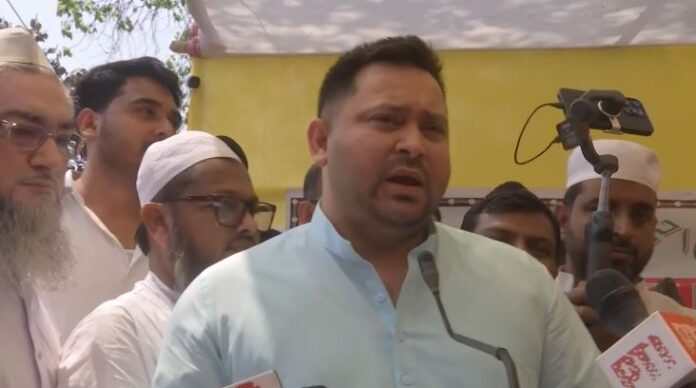Patna (Bihar) [India], March 26: Rashtriya Janata Dal (RJD) chief Lalu Prasad Yadav and Bihar Leader of Opposition Tejashwi Yadav participated in the All India Muslim Personal Law Board (AIMPLB) protest against the Waqf (Amendment) Bill, calling it “unconstitutional” and vowing to oppose its passage.
Addressing protestors, Tejashwi assured them of his party’s firm stance against the bill, stating, “RJD leader Lalu Prasad Yadav has come here to support and strengthen you. We opposed this unconstitutional, undemocratic bill in Parliament, Vidhan Sabha, and Vidhan Parishad. Today, we brought an adjournment motion and demanded a discussion, but the House was adjourned. We will do everything to ensure this bill is not passed.”
Emphasizing the party’s commitment to secularism and constitutional values, Tejashwi added, “We believe in Ganga-Jamuni Tehzeeb, and at any cost, we will try to stop this bill.”
Taking a dig at the Bharatiya Janata Party (BJP), he accused the government of working to “divide the country, dismantle democracy, and weaken the Constitution.” He further alleged that certain political parties were supporting the bill out of a “greed for power.”
The AIMPLB has launched a nationwide protest against the Waqf (Amendment) Bill, with Patna emerging as a key protest site.
BJP MP Defends Bill, Criticizes AIMPLB Protests
BJP MP and chairman of the Joint Parliamentary Committee (JPC) on the Waqf Amendment Bill, Jagadambika Pal, criticized the AIMPLB’s agitation, accusing it of politicizing the issue.
“The AIMPLB is misleading minorities and Muslims for political gains. The law hasn’t even been passed yet, and they are already staging protests in Patna based on a pre-planned political agenda,” Pal stated.
The Waqf (Amendment) Bill, 2024, aims to introduce reforms including digitization of records, enhanced audits, improved transparency, and legal mechanisms to reclaim illegally occupied Waqf properties. The proposed amendments seek to ensure that Waqf properties are used for their intended purposes, benefiting the Muslim community and the nation as a whole.
As tensions rise over the bill, political and community leaders remain divided over its implications, setting the stage for further debate.


